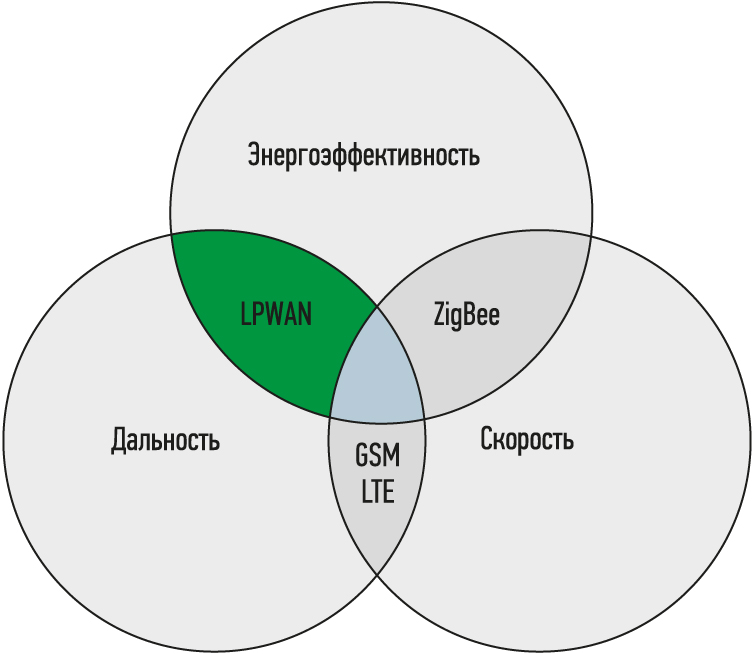In December, decide on the mandatory registration of base stations LPWAN
 In November 2018, the RF State Radio Frequency Commission prepared a draft decision , which requires that only Russian-made LPWAN base stations be used for the Internet of things. LPWAN networks operate in a number of bands, and the project also provided for the mandatory registration of base stations, which correspond to a number of parameters in terms of power and data transmission range.
In November 2018, the RF State Radio Frequency Commission prepared a draft decision , which requires that only Russian-made LPWAN base stations be used for the Internet of things. LPWAN networks operate in a number of bands, and the project also provided for the mandatory registration of base stations, which correspond to a number of parameters in terms of power and data transmission range. Such a proposal by GKRCH caused sharp criticism from the Association of Participants of the Internet of Things Market (unites ER-Telecom, MTS, Rostelecom, MTT, etc.). In the telegram channel "Non-digital economy" published a letter, sent by members of the association to the Ministry of Communications. They challenged this decision on the basis of the fact that Russian manufacturers are not yet able to provide the necessary market volume, quality and functionality of base stations for the Internet of things. And registration requirements are also excessive, because now thousands of LPWAN base stations are already operating in dozens of Russian cities, and in 2017, telecom operators extended the validity of permissions to frequencies for LPWAN.
Faced with such criticism and complaints at the Ministry of Communications, the State Commission for Radio Frequencies did not force the above-mentioned draft decision on LPWAN. Thus, the operators will continue to work in unlicensed sections of the 800 MHz range (864 - 865 MHz, 866 - 868 MHz and 868.7 - 869.2 MHz).
LPWAN (Low-power Wide-area Network) is a wireless technology for transmitting small data over long distances, designed for distributed telemetry networks, machine-to-machine interaction and the Internet of things. LPWAN is one of the wireless technologies that provide an environment for collecting data from various equipment: sensors, meters and sensors. The principle of data transmission using LPWAN technology at the physical PHY level is based on the property of radio systems - an increase in energy, and hence the communication range with a decrease in the transmission rate. The lower the bit rate of transmission, the more energy is invested in each bit and the easier it is to distinguish it against the background noise in the receiving part of the system. Thus, a low data transfer rate allows you to achieve a greater range of their reception.
Today, LPWAN networks are widely used not only by commercial telecom operators, but also by start-ups, including in the student and academic environment.
Speaking for the mandatory registration of LPWAN base stations, the state commission mentioned a similar procedure for Wi-Fi base stations. However, there is a difference. Experts from the IoT field on the same telegram channel explain (stylistic and spelling features are preserved): “The IoT BS features are such that no radio monitoring can be organized for them, the RKN is in search of these BSs, especially in 90% of the subjects on this range. " According to the expert, the draft decision of the SCRF was written in Era-Glonass, and in Mintsifre “there are no staff members who understand this.”
Thus, the document "turned". The decision on the fate of LPWAN was decided to be postponed to the next meeting of the SCRF, which is scheduled for December 2018, writes Cnews. Apparently, it will still not be possible to avoid mandatory registration: Deputy Minister of Communications Oleg Ivanov expressed the opinion that “it would be wrong to continue the uncontrolled development of LPWAN networks, as the networks will interfere with each other. In addition, the LPWAN standard requires sustainability testing. Base stations of this device can fail due to a large number of requests to them - a kind of DDoS attacks. ”
The Ministry of Communications and Mass Communications considers it expedient “instead of the requirement to obtain permission to use radio frequencies, to introduce mandatory registration of LPWAN standard facilities. It can be done in a simplified procedure through a personal account on the Roskomnadzor website. ”
According to insiders , the decision on mandatory registration is beneficial for GLONASS-TP, a joint venture of GLONASS (operator of the emergency response system for the Era-GLONASS accident) and RT-Invest (operator of the system for charging heavy vehicles Platon ). At a secret meeting, the State Committee for Radio Frequencies already allocated frequencies in the 800 MHz range to this enterprise to create a federal telematic information network along highways.
As for domestic equipment for LPWAN networks, Oleg Ivanov agreed with the thesis that it does not exist yet.
